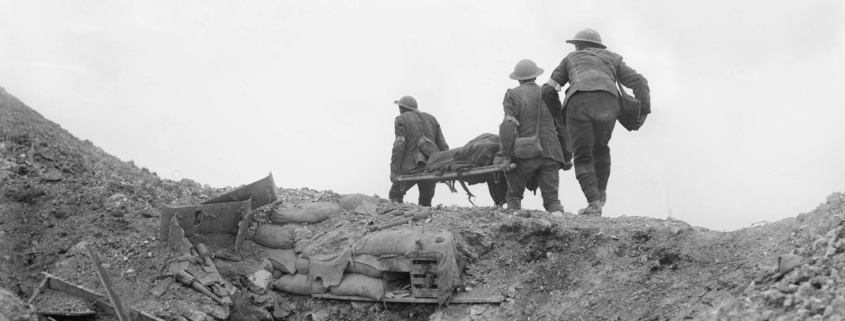Most of us will have our own memories today. Both of my grandfathers fought in France. One never spoke of it to me. The other Arthur, took me aside when I was 16, the same age as the youngest boys who served in France. He told me of his time in the trenches as a volunteer. He was wounded in one of the great battles of the war, I think the Somme. For three days he lay in no man’s land. He was eventually rescued at the cost of several other lives. He carried shrapnel in his body for the rest of his life, was unable to find work and, like all who served, carried memories which scarred and shaped him and his family.
Arthur’s sacrifice and the sacrifice of his generation mattered. He lived to see his children and his grandchildren which many did not. It mattered that we understood why they fought and what they endured. It mattered that his generation passed on those values and remembered. It would have mattered to him that we are here today, remembering together, giving thanks, keeping alive the meaning of their sacrifice in music and silence and prayer and memory.
Over the past four years as a nation we have together remembered each stage of the Great War. In 2014 I was present at the moving commemoration of a memorial to a soldier awarded the Victoria Cross in the centre of Sheffield, where I was then Bishop. In 2016 I travelled with a group from Sheffield to the Somme battlefields to remember the Yorkshire PALS regiments, many of whom were mown down by German machine guns on the first and dreadful day of that battle. In November 2016 and 17 I have been with vast crowds and people of all faiths in St. Giles in Oxford as we remember together all that this war has meant. It seems to me that these centenary years have only deepened our commitment to draw together, to value the sacrifice of Arthur’s generation and to draw on their example and commitment to the good of others.
We are wise enough to know now that the battles our grandparents fought did not end at the eleventh hour of the eleventh day of the eleventh month when the artillery fell silent on the Western Front. The battles against tyranny and isolation and prejudice and inequality continue. The search for purpose and meaning and love continues still. Those battles need to be set in an eternal perspective. They recur in different ways in each generation.
Paul writes of that new and eternal perspective which flows from one person, Jesus Christ, the Son of God. God has reconciled us to himself through Christ. The destiny of humankind is not fragmentation and war but common purpose and unity and a new creation. We are part of this bigger story. God has now entrusted to us the ministry of reconciliation. It is our mission, in every generation, to work for peace and freedom and justice with the same commitment shown by the generation who fought the Great War.
As we look back one hundred years it is possible to see in our nation then a greater common purpose than we see today. We are not blind to the weaknesses of the war generation nor to the mistakes that were made. But we do see a commitment to a common cause, a confidence in the values of peace and truth and the common good, a desire to see the world reconciled and a willingness to face together the great challenges of the age.
Such common cause today defeats us. We are finding it difficult as a nation even to rethink and reimagine our relationship with Europe in a way that brings unity and common purpose. We grow more not less fragmented along lines of race and religion and politics and wealth. Our common discourse all too easily admits the language of hate and violence.
If we cannot reimagine a new relationship with Europe how will we begin to face the global challenges of climate change, of new technologies, of global migration and of common purpose and meaning?
The generation of the Great War faced their moment of great crisis and rose to that moment in unity and sacrifice and purpose. We face in our own generation challenges of equal weight though we do not see them as clearly. In the stories of our past we need to find inspiration and fresh vision for our future. In our acts of remembrance in this centenary year we need to remember who we are. As we remember the fallen and care for those affected by war we need to rededicate ourselves to the cause of peace and to the common good for which men and women gave their lives.
This is our long story. We are part of a longer story of remaking and peace and reconciliation. In Christ God was reconciling the world to himself and has entrusted the message of reconciliation to us.
+Steven
a sermon given at the 2018 Festival of Remembrance, Reading Minster.
see also First World War Centenary – Remembrance resources for church leaders, children’s workers and teachers.

